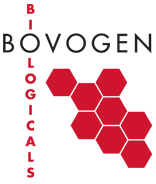
What is BSA?
BSA is Bovine Serum Albumin. Albumin is the most abundant protein in mammalian blood, and the most prominent plasma protein (approximately 60% of the total protein content of plasma). BSA is a globular non-glycosylated protein, and is synthesized in the liver.
The BSA molecule consists of 583 amino acids, bound in a single chain cross-linked with 17 cystine residues (eight disulphide bonds and one free thiol group), and has a molecular mass of 66400 Da. The amino acid chain is made up of three homologous, but structurally distinct, domains (I, II and III), divided into nine loops by the disulphide bonds and arranged into a heart-shaped molecule. Each domain consists of two sub-domains, A and B.
What does Cohn Fraction V mean?
Fraction V refers to the fifth fraction of the plasma proteins using Cohn purification fractionation process.
The process was first commercialized with human albumin and is still commonly used as a name for BSA regardless of purification method.
What does Heat Shock mean?
Most modern BSA fractionation processes use heat, rather than organic solvents, at several key steps, hence the reference to Heath Shock fractionation. Heat-Shock fractionation involves the controlled manipulation of temperature and filtration to separate the albumin from the other plasma components, during which the BSA is protected.
Modern-day large-scale production of BSA utilises either the Heat Shock fractionation method or a combination of the Heat Shock and the Cohn fractionation methods.
What is the shelf life of BSA?
Bovogen Biologicals Bovine Serum Albumin (BSA) has a shelf life of 3* years, commencing from the date of manufacture. We state the expiry date on our product label. Our product Certificate of Analysis states both the Date of Manufacture and the Expiry Date.
A Certificate of Analysis is available on request for all our product batches.
(*) Stability trials demonstrate our BSA remains highly stable well in excess of 3 years. Contact Bovogen for more information.
What does raw material Country of Origin mean?
The country of origin of the raw material refers to the country from which the blood (or plasma) was collected (sourced). Our BSA product label states the country of origin from where the raw material was sourced to manufacture the BSA.
Contact us to discuss the detail of our unique traceability supply chain and product traceability guarantee.
What does BSA Country of Manufacture mean?
The country of manufacture is the country where the BSA was manufactured. For example, “Country of Manufacture in Australia” means the BSA was manufactured at our plant in Melbourne, Australia.
Country of Origin and Country of Manufacture can be different. For example, our BSA may state the Country of Origin as New Zealand and Country of Manufacture as Australia. This means the raw material was collected/processed in New Zealand by our parent company ANZCO Foods Ltd, and the BSA was manufactured at our plant in Melbourne, Australia.
What does BSA traceability mean?
There are many variances to how traceability is defined by suppliers. Bovogen traceability is very clear for each origin of BSA supplied to the global market. Our Certificate of Origin states the country from which the raw material was sourced. A Certificate of Origin is available on request for every product batch we manufacture.
The raw material Country of Origin is important for insights into the countries’ animal health and disease status, as recognised by the World Organisation of Animal Health (OIE). Australia and New Zealand are amongst the highest rated countries for freedom from certain animal diseases and our BSA is often regarded as a premium product for this reason.
If traceability and sourcing provenance is important to your quality control and quality assurance requirements, it is recommended you discuss this with your supplier.


